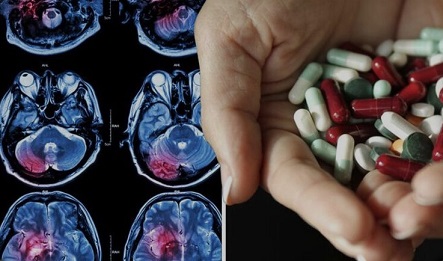Nikhil Prasad Fact checked by:Thailand Medical News Team Jun 06, 2024 1 year, 7 months, 3 weeks, 6 days, 4 hours, 14 minutes ago
Medical News: Recent research indicates that some commonly prescribed medications might reduce the risk of brain aneurysms rupturing, potentially preventing severe bleeding strokes. The study by researchers from University Medical Center Utrecht - Netherlands covered in this
Medical News report explores associations rather than proving causality. Nevertheless, the findings offer hope for non-invasive preventative treatments.
 Drugs and Brain Aneurysms: Promising Findings in Stroke Prevention
Understanding Brain Aneurysms and Their Risks
Drugs and Brain Aneurysms: Promising Findings in Stroke Prevention
Understanding Brain Aneurysms and Their Risks
A brain aneurysm occurs when a blood vessel in the brain bulges and fills with blood. If it ruptures, it can cause a subarachnoid hemorrhage, a type of stroke characterized by bleeding in the area between the brain and the tissues covering it. This condition, though less common than other types of strokes, is particularly deadly and often affects younger individuals.
The current treatment options for brain aneurysms involve invasive surgical procedures that carry significant risks, including permanent disability and death. Therefore, finding a non-invasive drug treatment to prevent aneurysm rupture is a high priority.
The Study: Methods and Findings
Researchers conducted a comprehensive analysis using electronic health records from 4,879 individuals who experienced a ruptured brain aneurysm, comparing them with 43,911 individuals of the same age and sex who had not. The goal was to identify whether certain prescribed medications were associated with a reduced risk of aneurysm rupture.
The study identified four medications linked to a decreased risk of ruptured brain aneurysms:
-Lisinopril (a blood pressure medication): Users were 37% less likely to experience a rupture.
-Simvastatin (a cholesterol-lowering drug): Users had a 22% reduced risk.
-Metformin (a diabetes medication): Users were 42% less likely to have a rupture.
-Tamsulosin (used for enlarged prostate): Users had a 45% lower risk.
Conversely, four medications were associated with an increased risk:
-Warfarin (a blood thinner)
-Venlafaxine (an antidepressant)
-Prochlorperazine (an antipsychotic and anti-emetic)
-Co-codamol (a painkiller)
Potential Impact and Future Research
The potential for these medications to prevent aneurysm rupture could revolutionize treatment, shifting focus from risky surgical interventions to safer, drug-based therapies. However, further research is needed to understand these associations better and determine whether these drugs can effectively reduce the risk of
hemorrhagic stroke.
Study author Jos Peter Kanning, MSc, from University Medical Center Utrecht, emphasized the need for new preventative methods: "We urgently need new ways to prevent this type of stroke, which occurs at younger ages and with a higher death rate than other types of stroke."
The study's results are promising but should be interpreted with caution. While the associations are significant, they do not prove causation. Future studies will need to confirm these findings through clinical trials and more detailed investigations.
Study Limitations
The study's reliance on electronic health records means it couldn't confirm whether patients were taking their medications as prescribed. There could be discrepancies between prescription data and actual drug use, which might affect the results.
Moreover, the study's design couldn't account for all variables, and other factors could contribute to the risk of aneurysm rupture. Despite adjusting for known risk factors like high blood pressure, smoking, and alcohol use, the possibility of residual confounding remains.
Broader Implications for Stroke Prevention
The findings open new avenues for stroke prevention research. If future studies confirm the protective effects of these drugs, they could become part of a preventative regimen for individuals at high risk of brain aneurysms. Additionally, understanding why these drugs might reduce rupture risk could lead to the development of new medications targeting specific pathways involved in aneurysm stability.
Conclusion
This study sheds light on potential new strategies for preventing ruptured brain aneurysms through the use of common medications. While the results are preliminary, they highlight the importance of continuing research in this area. The goal is to provide safer, non-invasive options for patients at risk, ultimately reducing the incidence and severity of hemorrhagic strokes.
By identifying drugs that might lower the risk of aneurysm rupture, this research paves the way for innovative treatment approaches, offering hope for better management and prevention of this life-threatening condition. Future studies will be crucial in validating these findings and translating them into clinical practice.
The study findings were published in the peer reviewed journal: Neurology.
https://www.neurology.org/doi/10.1212/WNL.0000000000209479
For the latest on Strokes, keep on logging to Thailand
Medical News.
Read Also:
https://www.thailandmedical.news/news/cannabis-news-massachusetts-general-hospital-s-study-finds-that-cannabis-use-increases-risk-of-heart-attacks-and-strokes
https://www.thailandmedical.news/news/covid-19-news-numerous-studies-and-emerging-data-are-warning-that-strokes-and-heart-failures-are-a-serious-threat-for-post-covid-individuals
https://www.thailandmedical.news/news/breaking-swedish-study-shows-that-covid-19-is-now-a-key-driver-for-heart-attacks-and-strokes
